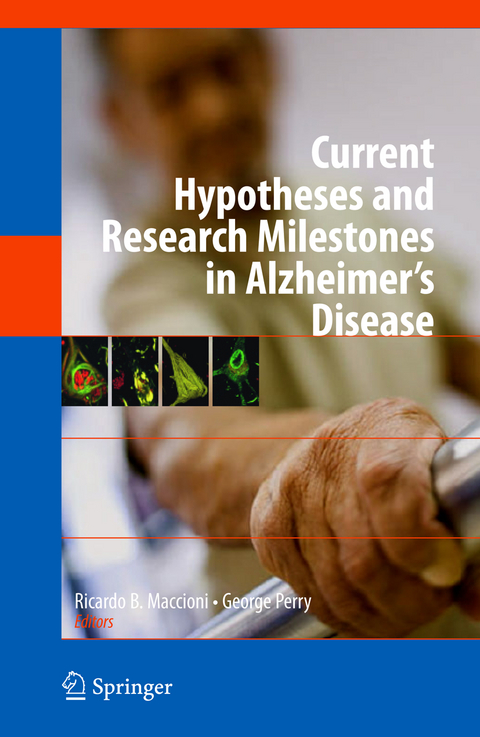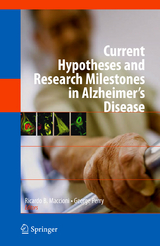Current Hypotheses and Research Milestones in Alzheimer's Disease
Springer-Verlag New York Inc.
978-0-387-87994-9 (ISBN)
- Lieferbar (Termin unbekannt)
- Versandkostenfrei innerhalb Deutschlands
- Auch auf Rechnung
- Verfügbarkeit in der Filiale vor Ort prüfen
- Artikel merken
Current Hypotheses and Research Milestones in Alzheimer's Disease contains 20 seminal chapters by authors with varying views on the neuroanatomical, neuropathological, neuropsychological, neurological, and molecular aspects of AD. These chapters grew out of “Current Hypothesis on Alzheimer’s Disease”, held in Viña del Mar, Chile, in November of 2007. Participants included the world’s leading Alzheimer’s researchers, whose work has illuminated AD investigations during the past few decades.
Students, academics and medical professionals will find this text an invaluable addition to the study of this important subject.
About the authors: Ricardo B. Maccioni, Ph.D. is a Professor of Neurology at the Medical School and the Department of Biology, Faculty of Sciences, at the University of Chile. George Perry, Ph.D. is the Dean of the College of Sciences at The University of Texas at San Antonio. Dr. Perry received his doctoral degree in marine biology from the Scripps Institution of Oceanography at the University of California at San Diego, served as a postdoctoral fellow in cell biology at Baylor College of Medicine, and earned a bachelor's degree in zoology from the University of California at Santa Barbara. He is an authority on Alzheimer’s research; his groundbreaking work brought oxidative stress to the study of AD. This discovery, far in advance of others, has put him among the top dozen most cited investigators studying AD/oxidative stress and among the top 25 neuroscientists in the world. Dr. Perry serves on the editorial board of more than 60 publications and is founding Editor-in-Chief of the highest impact journal in AD research, the Journal of Alzheimer’s Disease. He recently won the Denham Harmon Lifetime Achievement Award (discoverer of the Free Radical Theory of Aging) from the American Association for Aging, and currently holds the Zenith Award from the Alzheimer Association.
Amyloid-ß: General Aspects.- Role of A? Degrading Enzymes in Synaptic Plasticity and Neurogenesis in Alzheimer’s Disease.- Pore-Forming Neurotoxin-Like Mechanism for A? Oligomer-Induced Synaptic Failure.- Interventions in Aging and Neurodegenerative Disease: Effects on Adult StemCells.- Neuronal Cytoskeleton and the Tau Hypothesis.- Tau Transgenic Mouse Models in Therapeutic Development.- What Have We Learned from the Tau Hypothesis?.- Neuronal Cytoskeleton Regulation and Neurodegeneration.- Stages of Pathological Tau-Protein Processing in Alzheimer’s Disease: From Soluble Aggregations to Polymerization into Insoluble Tau-PHFs.- Plasma Membrane-Associated PHF-Core Could be the Trigger for Tau Aggregation in Alzheimer’s Disease.- Oxidative Stress Hypothesis.- Neurofibrillary Tangle Formation as a Protective Response to Oxidative Stress in Alzheimer’s Disease.- Neuroimmunological Hypothesis.- Inflammatory Processes Exacerbate Degenerative Neurological Disorders.- Central Nervous System Inflammation and Cholesterol Metabolism Alterations in the Pathogenesis of Alzheimer’s Disease and Their Diagnostic and Therapeutic Implications.- Participation of Glial Cells in the Pathogenesis of AD: A Different View on Neuroinflammation.- Cerebrovascular Pathology and AD.- Cerebral and Cardiac Vascular Pathology in Alzheimer’s Disease.- Are Amyloids Infectious?.- The Possible Link Between Herpes Simplex Virus Type 1 Infection and Neurodegeneration.- General Aspects of AD Pathogenesis.- Selective Cerebrocortical Regional, Laminar, Modular and Cellular Vulnerability and Sparing in Alzheimer’s Disease: Unexploited Clues to Pathogenesis, Pathophysiology, Molecular- and Systems-Level Hypothesis Generation and Experimental Testing.- How Biochemical Pathways for Disease May beTriggered by Early-Life Events.- Biomarkers and AD.- Strategies for Alzheimer's Disease Diagnosis.- Cognitive Neurology in AD.- The Diagnosis of Dementia in Subjects with Heterogeneous Educational Levels.- Current Anti-Dementia Drugs: Hypothesis and Clinical Benefits.
| Zusatzinfo | 35 Illustrations, color; 100 Illustrations, black and white; X, 254 p. 135 illus., 35 illus. in color. |
|---|---|
| Verlagsort | New York, NY |
| Sprache | englisch |
| Maße | 155 x 235 mm |
| Themenwelt | Medizin / Pharmazie ► Medizinische Fachgebiete ► Geriatrie |
| Medizin / Pharmazie ► Medizinische Fachgebiete ► Neurologie | |
| Medizin / Pharmazie ► Medizinische Fachgebiete ► Psychiatrie / Psychotherapie | |
| Medizin / Pharmazie ► Studium | |
| Naturwissenschaften ► Biologie ► Humanbiologie | |
| ISBN-10 | 0-387-87994-3 / 0387879943 |
| ISBN-13 | 978-0-387-87994-9 / 9780387879949 |
| Zustand | Neuware |
| Haben Sie eine Frage zum Produkt? |
aus dem Bereich




